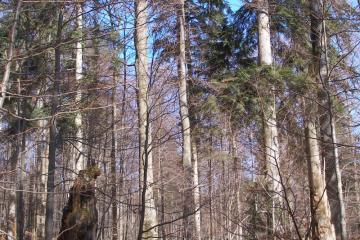Three natural forest reserves – Mionší, Razula, and Salajka – represent current Carpathian fir-beech forests. They were historically influenced by a Walachian colonization that came to the Beskydy Mts. from south and affected forests by sheep grazing, litter raking, and gathering beech firewood. Although excess felling was not realized in these natural forests, species structure was affected in favour of fir during modern times. Since the 1930s, all three LTER sites have been left to spontaneous development. Beech has returned as the main species of these stands. Exceeding numbers of deer game populations, which represent main indirect human influence in these reserves, block growing out of fir seedlings considerably. Various ways of seedling protection are tested inside the sites; however, no selective interventions on advanced growth are practiced. Indispensable positive influence should play a gradual return of natural predators of deer game (lynx, wolf, and also bear) into the western Carpathians.
| Site | Mionší 1 | Mionší 2 | Mionší 3 | Salajka | Razula |
|---|---|---|---|---|---|
| Area (ha) | 5,92 | 2,54 | 1,00 | 19,03 | 22,84 |
| Latitude (N, centre) | 49°32'11" | 49°32'16" | 49°32'10" | 49°24'07" | 49°21'35" |
| Longitude (E, centre) | 18°39'37" | 18°39'40" | 18°39'16" | 18°25'17" | 18°23'03" |
| Minimum altitude (m a.s.l.) | 817 | 778 | 810 | 715 | 600 |
| Maximum altitude (m a.s.l.) | 890 | 884 | 850 | 820 | 812 |
| Natural development since | 1935 | 1935 | 1935 | 1925 | 1935 |
| Complete dendrometry in | 1995, 2009 | 1957, 2004 | 1953, 1999 | 1974, 1994, 2007, 2018 | 1972, 1995, 2009 |

 Supported by Advance eLTER project number 739558
Supported by Advance eLTER project number 739558